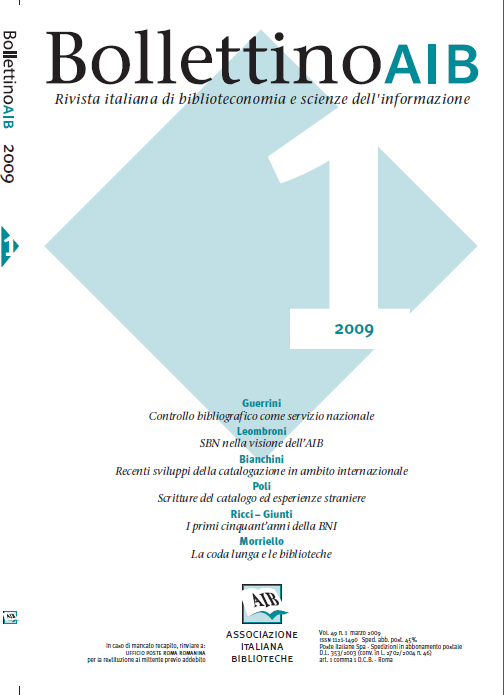The Italian National Bibliography in bibliographic control: how and how much?
Main Article Content
Abstract
National bibliographies are a tool for bibliographic control in each country. For Italy this role is carried out by the Italian National Bibliography and it is divided into series reserved for the various types of publication: Monographs, Printed Music, Children's books, School texts, Doctorate Theses, Periodicals. There is no series dedicated to electronic resources; those that arrive as a CD-ROM or DVD with a publication are described in its relative series while, even today, there is no regulation on the "legal deposit" of actual electronic publications (files or remote resources).
In recent years, the BNI (Italian National Bibliography) has carried out bibliographical control both on descriptive cataloguing, since 1993 cooperating with the National Librarian Service, and on semantic cataloguing and classification with DDC, two editions of which it has translated. Cooperation in the field of semantic indexing is starting now: at this stage it is aimed in increasing the Thesaurus of the new indexing language. Three universities, some present and some not in SBN, have drawn up agreements in this regard and are about to enter the operational phase.
As regards processing, experimenting and guides to the use of standards and tools, there are considerable problems and lacunae but there are also some aspects of undoubted vitality. Bibliography does not carry out its function at a level of coverage and timeliness, problems that put its very survival at risk. It is a rather unique case in a time of strong evolution and reconversion of national bibliographies in Europe and in the world.
Special policies and new solutions are however not only required but also possible, within the sphere of a relaunch and development project. Both this AIB 2008 Congress and the 2009 IFLA Conference can act as useful occasions for reversing the current difficult situation into a positive one, turning the attention of the national and international library world to a process of essential re- development of the national bibliographical services.
In recent years, the BNI (Italian National Bibliography) has carried out bibliographical control both on descriptive cataloguing, since 1993 cooperating with the National Librarian Service, and on semantic cataloguing and classification with DDC, two editions of which it has translated. Cooperation in the field of semantic indexing is starting now: at this stage it is aimed in increasing the Thesaurus of the new indexing language. Three universities, some present and some not in SBN, have drawn up agreements in this regard and are about to enter the operational phase.
As regards processing, experimenting and guides to the use of standards and tools, there are considerable problems and lacunae but there are also some aspects of undoubted vitality. Bibliography does not carry out its function at a level of coverage and timeliness, problems that put its very survival at risk. It is a rather unique case in a time of strong evolution and reconversion of national bibliographies in Europe and in the world.
Special policies and new solutions are however not only required but also possible, within the sphere of a relaunch and development project. Both this AIB 2008 Congress and the 2009 IFLA Conference can act as useful occasions for reversing the current difficult situation into a positive one, turning the attention of the national and international library world to a process of essential re- development of the national bibliographical services.
Article Details
Section
Articles

This work is licensed under a Creative Commons Attribution-ShareAlike 4.0 International License.
